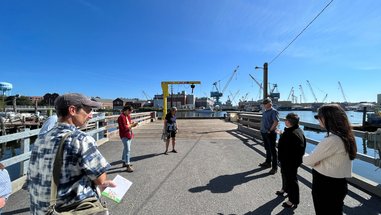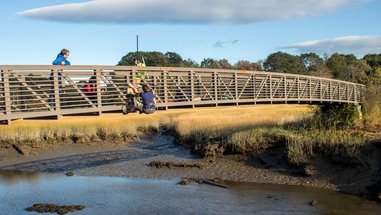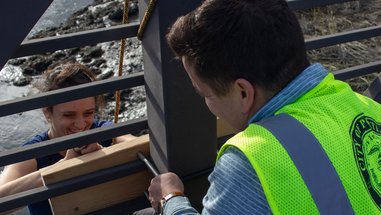Helping Working Waterfronts Thrive in a Warming World
To ensure working waterfront communities thrive in a warmer world, we’re developing a statewide model approach for working waterfront climate planning that can be used …

How can we help prepare coastal communities to adapt and thrive in a warmer world?
What tools do our children and grandchildren need to tackle tomorrow's climate challenges?
Where will fish populations shift as the ecosystem changes, and what does that mean for how we manage and harvest those species?
How can we downscale global and national climate expertise to develop local, community-driven climate solutions?

Sea level rise is exacerbating the impacts of coastal storms and rapidly increasing the frequency of high tide flooding, threatening coastlines and intertidal ecosystems. More frequent heavy precipitation events are also causing widespread and costly damage to infrastructure and the environment. Recently, over four weeks in December 2023 and January 2024, three storms drove record-breaking inland and coastal flooding and unprecedented damage to Maine communities, including an estimated $90 million in damage to public infrastructure.
Our research team advances our scientific understanding of the causes and impacts of climate change in our region. These internationally-recognized climate scientists monitor current climate impacts and project future impacts to support community planning efforts. Their global networks allow them to extend our impact beyond the Gulf of Maine.
We then translate this scientific understanding into climate action in partnership with communities that hold deep localized knowledge, transmitted through generations. These communities count on us for "K-to-Gray" climate education programming, support for rural municipalities, science-based tools, and other resources that create climate resilience.
To ensure working waterfront communities thrive in a warmer world, we’re developing a statewide model approach for working waterfront climate planning that can be used …
Helping communities connected to the Gulf of Maine successfully adapt to rapid change.
The Coastal Dynamics Lab studies changes in mean and extreme coastal and estuarine water levels to support coastal management, flood forecasting and preparedness, and state …
The Gulf of Maine is warming rapidly — but how rapidly, and why? Explore our annual Gulf of Maine Warming Update for a scientific exploration of recent warming conditions.
Annual Warming ReportLearn about the forces behind coastal storms, their unique impacts on the Gulf of Maine, and how communities are working to adapt.
Perspectives
National Geographic photographer Brian Skerry has been diving in the Gulf of Maine for more than 40 years. After learning these waters were a harbinger …
Press Clips
Learn about what marine heatwaves are and how they can disrupt coastal ecosystems and the communities that depend on them.
Perspectives
Our Climate Financing Program is designed to help communities overcome the financial barriers to climate action. Whether supporting disaster recovery or enabling proactive investments in …
Perspectives


